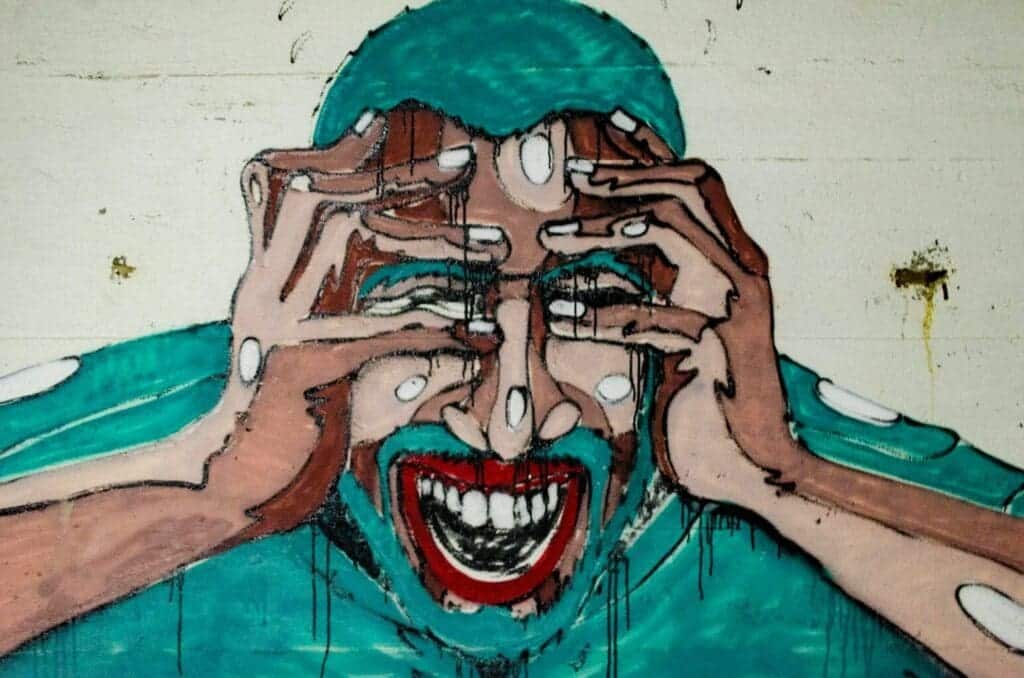Printable PDF version (in Italian)
Part I
Why is it so common to think lousy news is a better match for bad days? Fausto Marinelli received the most unpleasant news of his life during a sultry May morning.
A few weeks earlier, his life had begun to take a strange turn: his relationship with Cora, with whom he had started living together, had suddenly plunged into a destructive vortex and, without even explaining the reason, within a few days, Fausto, despite himself, had decided to cut off all contact with her. At the same time (it was not difficult for him to think of a correlation between the events), he had begun to experience a persistent stomachache that often even forced him to wake up in the middle of the night with stabbing cramps that would not stop even after taking the best painkillers.
When the complaints became unbearable, Fausto finally sought the advice of a doctor he had known since childhood. She visited him at the end of his shift, and after an in-depth examination, he had no hesitation in advising him to go to a specialized center immediately. In truth, he used very delicate words, but the way he apostrophized his friend when he expressed his desire to wait a little longer left no hope of the triviality of the matter.
It was precisely during the last days of May, with summer now settled with overbearing, that the head of the gastroenterology clinic, meeting Fausto in the waiting room of his outpatient clinic, began to shake his head, saying, “Do you know, Mr. Marinelli, what is the greatest drama that afflicts a physician? Helplessness — yes, helplessness in the face of the object of our study…”
“Doctor,” asked the man, paling, “But so you are telling me…”
“Unfortunately,” the doctor interrupted him, “After all the checks, I regret to tell you that the diagnosis is…forgive me for misusing terms, but the right word is just…nefarious.“
Fausto sensed that his body manifested the unmistakable signs of dismay, but he could neither understand nor describe them. He remained silent, although words crowded like frenzied bees in his mind. In front of the chief physician were now two people: the first, mute and dignified, fully grasped the meaning of his decline and, almost with wonder, realized a strange form of tranquility. The other, however, was standing behind her and desperately scrambling to search her vocabulary for the meaning of the incomprehensible word “death.” It all boils down to this: not endless suffering or apathy created by meaningless waiting, but a daily phenomenon that people continue to observe in silence.
“I see…” he replied dryly as if something of little importance was at stake.
“Are you sure?” the doctor blocked him.
Fausto ran a hand over his face, “No, doctor…” he replied with a huff. “I’m not sure, but I doubt I have much freedom in interpreting what you just told me… Not to mention that by now, I throw up even after swallowing a candy. What should I expect? You tell me…”
The doctor only winced, “I will prescribe a treatment to reduce the most unpleasant symptoms, but there will come a time when they will be of little use … and, at that time, you will be forced to go to the hospital and…”
“And to never come out again,” Fausto finished, “It’s clear, doctor, no further details are needed. But, tell me, when do you think that fateful moment will come?“
The chief physician froze at that parade of bravado. He had dealt with many similar cases in his career and knew well that reactions are often unpredictable. Still, the man in front of him seemed to split in two: at times, he looked like a frightened patient to be held by the hand along that bumpy path, but after a while, a robot took over, capable of coldly analyzing every detail as if observing everything from an infinite distance.
“It’s hard to say,” he murmured, “However, I think it may lie between six months and a year… I’m sorry, but only a miracle can avert the worst for you, provided you believe in miracles. My very personal opinion is that they could only work if you believe in them, which, allow me, implies that they don’t work at all… But excuse me, I digress… Come to my office so I can prescribe the drugs for you to take.“
Fausto followed without commenting on what he had just heard. He left the clinic half an hour later with a prescription in his hand and a viaticum etched in his memory. His stomach was hurting a bit, but he still decided to go for a drink at a club that was right next to the medical center. He put the prescription in his pocket and walked through the wide doorway just as the sun began its decline toward the shameless beaches of California.
The establishment, a wine shop where frugal meals could be had, was filled with workers on their lunch break. Fausto chose a small, secluded table and ordered a glass of red wine and a sandwich. He knew very well that he would not be able to eat even that little food, especially without the help of medication, but he pretended that he could not and tried to behave like the other people in the room.
Once he received her order, he immediately sent down the wine and felt a pang below his sternum. It felt like a nail had dug a furrow down his esophagus, and now he was looking for space in his stomach. He closed his eyes and remained still: usually, those pains would pass after a few seconds; at worst, he would be forced to vomit.
The spasm passed, but his complexion remained pale, and his forehead filled with drops of sweat. Other patrons observed him distractedly as if he were one of those mutilated beggars begging on the street, but no one made sure to check if he was okay or needed help.
“Just as well,” thought Fausto, “Now I miss the compassion of strangers too…”
He continued with the sandwich, but on the third bite, he felt the disordered contractions in his stomach and realized he could no longer hold back. He came running out and headed for a garbage can. He vomited and spat blood. His throat burned, and he felt his belly like a boulder was pressing it. He awkwardly wiped his chin with the sleeve of his jacket and ran a hand over his frozen forehead.
“I can manage,” he repeated to himself, “With medication, this will not happen again. Rest assured, Fausto… The doctor seemed prepared. Who knows how many similar cases he will have dealt with? At the limit, if it doesn’t pass, I will increase the doses… What on earth could happen to me? A miracle? Yes, only a miracle… But I don’t believe in miracles, so what did the doctor say? It implies! Yeah… That implies that they don’t work. I could try to believe that I am not sick… Yes, of course, but how do you do it? Miracles make life easier for the disillusioned, but the snake that eats my insides, who convinces him? Aristotle with his syllogisms? Go figure… You’ll make it, Fausto. It’s already going through everything…“
After those convulsive thoughts reached the dead end that marks the boundary beyond which hope stops even acknowledging its existence, Fausto burst out laughing incessantly, bent in two on the bin. Everything was colored in the brightest hues, and its evil changed from an evil nuisance to a bizarre source of pleasure.
He looked at his watch: it was still very early. Tired but dizzy from his exhilaration, he strolled toward a bench at the edge of a small green area. He decided to wait there until the pain subsided; then, he would look for an open pharmacy to buy all the medications that had been recommended.
A small group of people passed by him. Fausto looked up at those “normal” faces and, in a few moments, reviewed the smiles, the grimaces, the gestures, the words thrown like snowballs, and even the quality of every outfit worn.
“These people will certainly believe in miracles,” he thought, “Why should I have a privileged position in this regard? Are these people perhaps immortal? No, of course. But on the other hand, every one of them, assuming I’m not wrong, of course, thinks of his future, a year from now, as if there were no threats in his path, while I already know that I will end up in a hospital bed and then under a mound of earth. Like everyone, like everyone, no doubt. But I know, and so, if the reasoning about miracles continues to be valid, it is already all real to me, concrete as a piece of marble. Can I force myself not to believe it? Can I succeed?“
He spit out more blood while hiding his mouth with his hand. That gesture, often so manly, had always been a source of disgust, but attempting to swallow it would undoubtedly cause him to gag again: between the two evils, with no small amount of shame, he, therefore, chose the less troublesome.
He tried to distract himself. He ran his foot over the remains of her blood and looked away to a billboard. Although he felt different from others, he could not feel lonely. He closed his eyes, pointed at the hellish mass of the sun, and without meaning to, Cora’s smiling face came back to his mind.
“Did you realize what an extraordinary favor I did you?” asked the ghost. “No? But if you kept repeating that you loved me… And what is more sadistic than denying the beloved object to your lover? What? Tell me if you can do it – you who always make a big deal of your romance!“
Fausto was sure he had repaid the misunderstanding with a priceless gift: disappearing before Cora could discover how crumbling the existence of the only man she loved meant sparing her the pain of a most painful loss. But then again, it was certainly not his fault that she had discovered her days were numbered, so if he had asked her to stay by his side (which she probably would not have done anyway), he would have condemned her with impunity to have to suffer defeat without even a culprit to blame.
“That would have been sadistic…” he repeated under his breath, “That would have been…” and burst into tears like a child, heedless of the passersby slowly returning to work.
Filed for legal guardianship with Patamu: certificate
Part I – Part II
If you like this story, you can always donate to support my activity! One coffee is enough!



